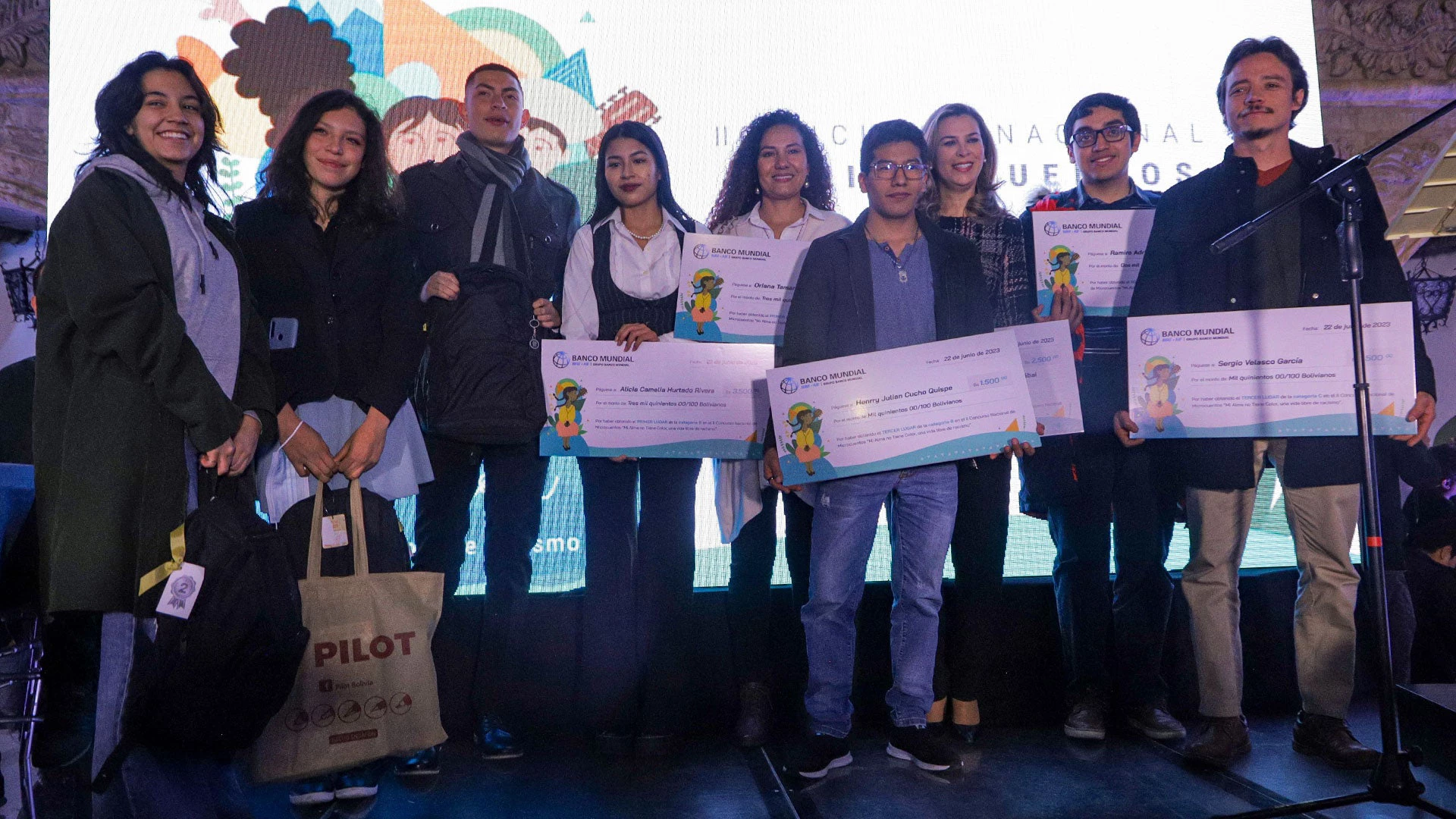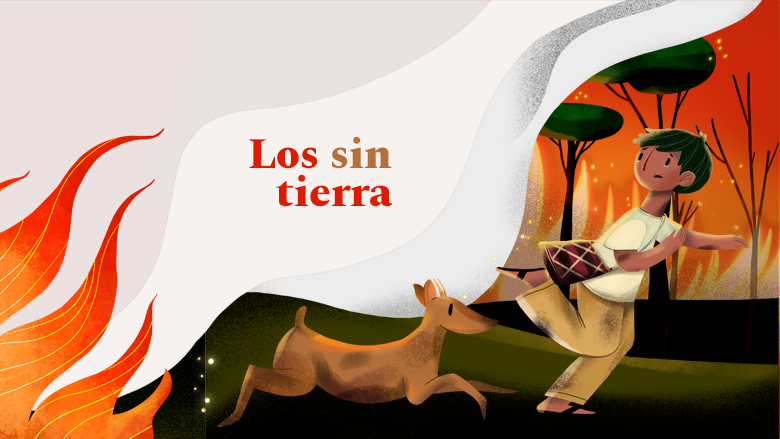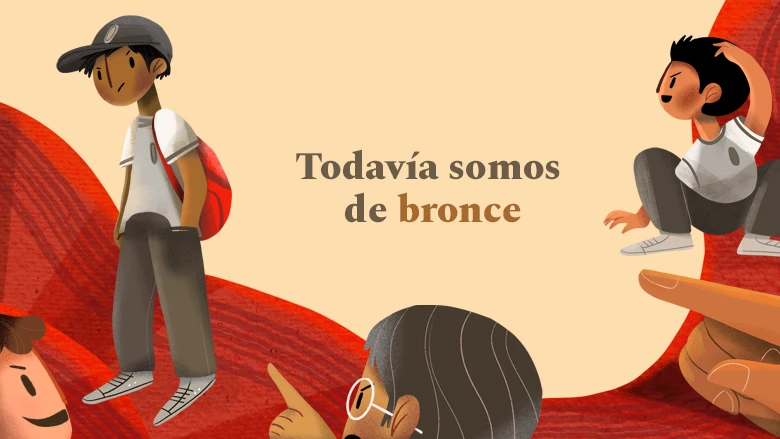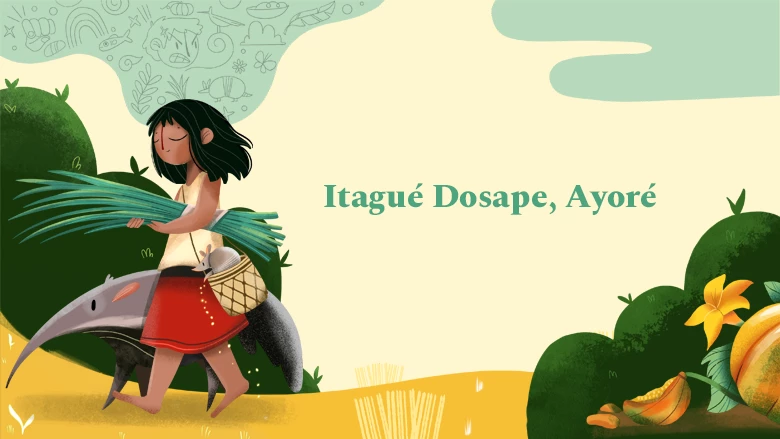 Los nueve ganadores del Concurso "Mi alma no tiene color, una vida libre de racismo" posando para la foto.
Los nueve ganadores del Concurso "Mi alma no tiene color, una vida libre de racismo" posando para la foto.
Bolivia is one of the Latin American countries with the highest share of indigenous population. According to data from the 2012 census, 40 percent of its inhabitants identify as Indigenous. Indigenous peoples and their descendants, the Afro-descendant community, and other minorities have historically faced social exclusion, which poses a barrier to the implementation of strategies to eliminate poverty and achieve comprehensive development.
This is why, in 2023 the World Bank’s Country Office team in Bolivia launched the second National Micro Story Contest, called “My Soul Has No Color, A Life Free from Racism”. The successful model implemented in 2021 was replicated, but this time, adding a category for youth between the ages of 13 and 17.
Registration for the second edition closed with more than 1,000 participants from the nine regions of the country and dozens of urban and rural municipalities –400 more participants than in the previous edition. Youth response was motivating: 364 writers in this category brought new perspectives to the analysis.
The jury, composed of renowned Bolivian writers Liliana Colanzi, Mauricio Murillo, and Rodrigo Urquiola, had the difficult task of selecting 15 finalists, nine winners, and the three most compelling stories.
Why Literature and Short Stories?
We wanted Bolivians of all ages to have the opportunity to participate in the discussion through an open contest. This way, while sharing their writing talent, they would be able to propose stories, characters, and situations of racism that would encourage community reflection. A democratic space rather than a purely academic or research-oriented one.
Literature builds bridges and promotes social dialogue. The Argentine writer Alberto Manguel, in his column “Leer literatura puede hacernos mejores [Reading literature can make us better people],” published in the New York Times in 2019, states, “Reading literature, an activity that many may consider idle or useless, has an invaluable social value: it makes us more empathetic, more willing to listen and understand others. Fiction teaches us to name our anxieties and also how to face and share our daily problems.”
The World Bank and Racism
The World Bank's Anti-Racism Charter, implemented by the Anti-Racism Task Force, aims to combat racism in our workplaces, development work, and local communities where projects are executed.
“I have been exposed to racism and discrimination since I was a child. I know that these types of experiences can lead you to develop insecurities in different areas. In my case, it was with my body. I was ashamed of my skin color, my broken Spanish, my straight hair, my clothes, and I could go on…” This testimony is part of the thousands of personal experiences shared by the authors when they registered in the contest. An expression of reality and not part of a fictitious story. It urges us to continue investing time, effort, and resources to be part of the solution.
The micro story contest aims to prompt reflection on the need to eliminate racism so that all people have the same social and economic opportunities and enjoy a free life, without exclusions and in full exercise of their rights.
We are encouraged by the results obtained in the two contest editions. Each story entered can be interpreted as a person reflecting on the subject, and each winning story, which will be read by thousands inside and outside Bolivia, can be a catalyst for collective conversations in society. A life free from racism is possible.
My Soul Has No Color, Winning Stories
Read the winning stories:
Category A (13 to 17 years old)
First place: Alejandro Numbela Rodríguez with the story “We Are Still Made of Bronze”. Available in: Spanish, English, Aymara, Quechua, and Guarani.
Category B (18 to 23 years old)

First place: Alicia Hurtado Rivera with the story “The Landless”. Available in Spanish, English, Aymara, Quechua, and Guarani
Category C (24 to 99 years old)
First place: Oriana de Alencar Villarroel with the story “Itagué Dosape, Ayoré”. Available in Spanish, English, Aymara, Quechua, and Guarani.
Bolivia: Short Story Contest – My Soul Has No Color – "Meet the Winners" Video (Captions in English available)
Other winning stories:
Category A (13 to 17 years old)
- Second place: “Spots” by Rebeca Borda Hurtado. Available in Spanish, and English.
- Third place: “And What about Them?” by Emilia Villarreal Rosquellas. Available in Spanish, and English.
Category B (18 to 23 years old)
- Second place: “Have You Seen My Son?” by Ramiro Araoz de la Torre. Available in Spanish, and English.
- Third place: “The Skin I Didn’t Want” by Henrry Cucho Quispe. Available in Spanish, and English.
Category C (24 to 99 years old)
- Second place: “What He’s Got is Not Enough” by Fadrique Iglesias Mendizábal. Available in Spanish, and English.
- Third place: “Aurelia” by Sergio Velasco García. Available in Spanish, and English.
Stay updated with our weekly article
Related Article:




Join the Conversation